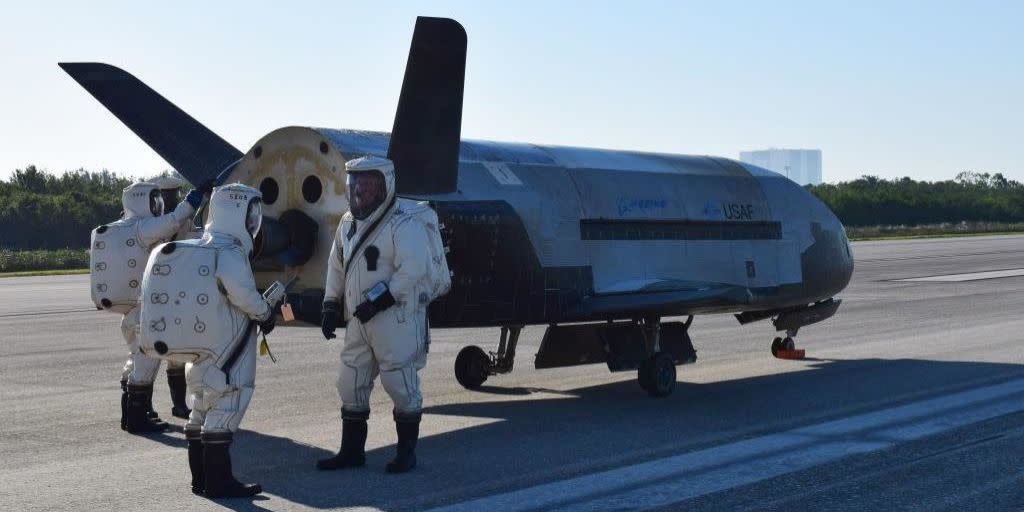Lawmakers Lay Groundwork for New Branch of the Military

(Image: The U.S. Air Force's X-37B unmanned spaceplane that orbits for hundreds of days at a time on classified missions.)
Lawmakers within the House Armed Services Committee have introduced legislation that would require the U.S. Air Force to establish a "Space Corps" as a distinct branch of the military by January 1, 2019, according to Space News. The proposed legislation would create a Space Corps to serve "as a separate military service within the Department of the Air Force and under the civilian leadership of the Secretary of the Air Force."
"There is bipartisan acknowledgement that the strategic advantages we derive from our national security space systems are eroding," said Republican Rep. Mike Rogers of Alabama and Democrat Rep. Jim Cooper of Tennessee in a statement. "We are convinced that the Department of Defense is unable to take the measures necessary to address these challenges effectively and decisively, or even recognize the nature and scale of its problems."
Rogers and Cooper are the top representatives of the Strategic Forces Subcommittee, which oversees military space operations. The House Armed Services Committee is preparing to vote on the National Defense Authorization Act (NDAA), and the subcommittee led by Rogers and Cooper introduced the new Space Corps legislation to the bill on Tuesday, June 20.
There are currently five branches of the United States Armed Forces: the Army, Navy, Marine Corps, Air Force, and Coast Guard. However, there are only three subordinate departments within the Department of Defense: the Department of the Army, the Department of the Navy, and the Department of the Air Force. The Marine Corps falls under the Department of the Navy, and in many cases Marines operate from Navy vessels, such as Marine Corps fighter squadrons that fly missions from Navy aircraft carriers. The Space Corps would be structured in much the same way, receiving its own four-star command but working closely with the Air Force to carry out its missions.
Command of the Space Corps would fall to its own chief, equal in rank to the Chief of Staff of the Air Force, who would sit on the Joint Chiefs of Staff and answer to the Secretary of the Air Force. The legislation would also establish a U.S. Space Command under the U.S. Strategic Command.
Congress believes rapidly increasing space infrastructure from nations around the world presents a potential threat to U.S. assets in orbit. If an adversary destroyed satellite networks, it could cripple communications and surveillance systems that the military depends on. Lawmakers and military commanders envision a future where space is much more accessible and crowded, and U.S. leaders worry that an adversary such as China or Russia could gain a strategic edge over the United States by establishing military capability in space first.
While a number of Air Force generals said in May that the creation of a Space Corps would ultimately be necessary, Air Force Chief of Staff Gen. David Goldfein maintains that the Air Force should manage military space operations for the time being. "I don't support it at this time," Goldfein said of the Space Corps proposal. "Whether there's a time in our future where we want to take a look at this again, I would say that we keep that dialog open, but right now I think it would actually move us backwards."
The introduction of legislation by the Strategic Force Subcommittee is just the beginning of a long road to actually establishing a Space Corps. The subcommittee will hold a formal legislative markup session to discuss the new portions of the bill on Thursday, June 22. After the subcommittee's session, the entire House Armed Services Committee will need to vote on the bill before it can be debated on the House floor, which is not expected to vote on the NDAA bill until after July 4. The Senate Armed Services Committee will also hold a markup session for the NDAA on June 28. If the Space Corps legislation in the bill makes it through votes from the entire House and Senate, then it will finally be sent to the White House to be signed into law.
Even if a Space Corps is not established by January 1, 2019, as currently proposed, lawmakers and military officers will continue to discuss the best way to provide for defense in orbit and beyond. In all likelihood, these debates will eventually lead to the sixth branch of the United States Armed Forces.
You Might Also Like

